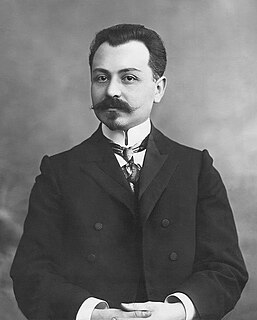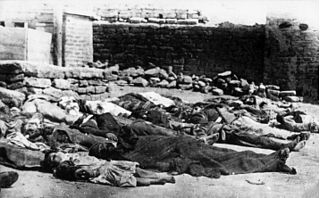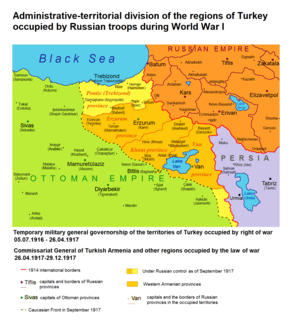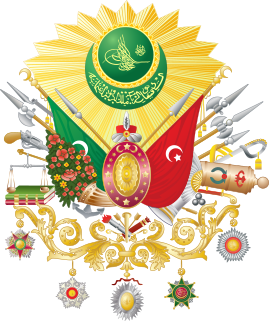
The Central Powers, also known as the Central Empires, was one of the two main coalitions that fought World War I (1914–18). It consisted of German Empire, Austria-Hungary, the Ottoman Empire and Kingdom of Bulgaria and was also known as the Quadruple Alliance. Colonies of these countries also fought on the Central Powers' side such as German New Guinea and German East Africa, until almost all of their colonies were occupied by the Allies.

The Democratic Republic of Georgia was the first modern establishment of a republic of Georgia, which existed from May 1918 through February 1921. Recognized by all major European powers of the time, DRG was created in the wake of the Russian Revolution of 1917, which led to the collapse of the Russian Empire and allowed territories formerly under Saint Petersburg's rule to assert independence. In contrast to Bolshevik Russia, DRG was governed by a moderate, multi-party political system led by the Georgian Social Democratic Party (Menshevik).

James Albert Edward Hamilton, 3rd Duke of Abercorn, styled Marquess of Hamilton between 1885 and 1913, was a British peer and Unionist politician. He was the first Governor of Northern Ireland, a post he held between 1922 and 1945. He was a great-grandfather of Diana, Princess of Wales.

The Transcaucasian Democratic Federative Republic was a short-lived state in the Caucasus that included most of the territory of the present-day Armenia, Azerbaijan and Georgia, as well as parts of Russia and Turkey. The state lasted only for a month before Georgia declared independence, followed shortly after by Armenia and Azerbaijan.

The Allies of World War I or Entente Powers were a coalition of countries led by France, Britain, Russia, Italy, Japan, and the United States against the Central Powers of Germany, Austria-Hungary, the Ottoman Empire, Bulgaria, and their colonies during the First World War (1914–1918).

The Azerbaijan Democratic Republic was a state in the South Caucasus. The ADR was founded by the Azerbaijani National Council in Tiflis on 28 May 1918 after the collapse of the Transcaucasian Democratic Federative Republic, and ceased to exist on April 28 1920. Its established borders were with Russia to the north, the Democratic Republic of Georgia to the north-west, the Republic of Armenia to the west, and Iran to the south. It had a population of around 3 million. Ganja was the temporary capital of the Republic as Baku was under Bolshevik control. The name of "Azerbaijan" which the leading Musavat party adopted, for political reasons, was, prior to the establishment of the Azerbaijan Democratic Republic in 1918, exclusively used to identify the adjacent region of contemporary northwestern Iran.

Lieutenant General Noel Mackintosh Stuart Irwin & Two Bars, MC was a senior British Army officer, who played a prominent role in the British Army after the Dunkirk evacuation, and in the Burma campaign during the Second World War. He was also instrumental in some reforms to the training and equipment of British soldiers after the defeat in France in 1940, intended to meet the demands of modern warfare.

Fatali Khan Isgender oglu Khoyski was an Azerbaijani attorney, a member of the Second State Duma of the Russian Empire, Minister of Internal Affairs, Minister of Defense and, later the first Prime Minister of the independent Azerbaijan Democratic Republic.

The First Republic of Armenia, officially known at the time of its existence as the Republic of Armenia, was the first modern Armenian state since the loss of Armenian statehood in the Middle Ages.

The Caucasus campaign comprised armed conflicts between the Russian Empire and the Ottoman Empire, later including Armenia, Azerbaijan, Georgia, the Mountainous Republic of the Northern Caucasus, the German Empire, the Central Caspian Dictatorship, and the British Empire, as part of the Middle Eastern theatre during World War I. The Caucasus campaign extended from the South Caucasus to the Armenian Highlands region, reaching as far as Trabzon, Bitlis, Mush and Van. The land warfare was accompanied by naval engagements in the Black Sea.

The King's Own Yorkshire Light Infantry (KOYLI) was a light infantry regiment of the British Army. It officially existed from 1881 to 1968, but its predecessors go back to 1755. In 1968, the regiment was amalgamated with the Somerset and Cornwall Light Infantry, the King's Shropshire Light Infantry and the Durham Light Infantry to form The Light Infantry, which in turn was merged with the Devonshire and Dorset Regiment, the Royal Gloucestershire, Berkshire and Wiltshire Regiment and the Royal Green Jackets to become The Rifles in 2007.

Lieutenant-General Sir William Raine Marshall was a British Army officer who in November 1917 succeeded Sir Frederick Stanley Maude as Commander-in-Chief of the British forces in Mesopotamia. He kept that position until the end of the First World War.

The March Days or March Events was a period of inter-ethnic strife and clashes which led to the death of about 12,000 Azerbaijani and other Muslim civilians that took place between 30 March – 2 April 1918 in the city of Baku and adjacent areas of the Baku Governorate of the Transcaucasian Democratic Federative Republic.

The occupation of Western Armenia by the Russian Empire during World War I began in 1915 formally ended by the Treaty of Brest-Litovsk. It was sometimes referred to as the Republic of Van by Armenians. Aram Manukian of Armenian Revolutionary Federation was the de facto head until July 1915. It was briefly referred to as "Free Vaspurakan". After a setback beginning in August 1915, it was re-established in June 1916. The region was allocated to Russia by the Allies in April 1916 under the Sazonov–Paléologue Agreement.

The Battle of Baku was a battle in World War I that took place between August–September 1918 between the Ottoman–Azerbaijani coalition forces led by Nuri Pasha and Bolshevik–ARF Baku Soviet forces, later succeeded by the British–Armenian–White Russian forces led by Lionel Dunsterville and saw Soviet Russia briefly re-enter the war. The battle was fought as a conclusive part of the Caucasus Campaign, but as a beginning of the Armenian–Azerbaijani War.

Maciej Sulkiewicz was a Imperial Russian lieutenant general, Prime Minister of Crimean Regional Government (1918), and Chief of General Staff of Azerbaijani Armed Forces in 1918–20.

The Allied leaders of World War I were the political and military figures that fought for or supported the Allies during World War I.

Hasan Mashadi Huseyn oghlu Aghayev, known also as Hasan bey Aghayev and Hasan bey Aghazade was an Azerbaijani public figure, journalist, doctor, teacher and politician. He served as the Deputy Speaker of National Assembly of Azerbaijan Democratic Republic (ADR).

The Ottoman Empire came into World War I as one of the Central Powers. The Ottoman Empire entered the war by carrying out a surprise attack on Russia's Black Sea coast on 29 October 1914, with Russia responding by declaring war on 5 November 1914. Ottoman forces fought the Entente in the Balkans and the Middle Eastern theatre of World War I. The Ottoman Empire's defeat in the war in 1918 was crucial in the eventual dissolution of the empire in 1922.

Lazar Fedorovich Bicherakhov was a Russian army officer who participated in World War I and the Russian Civil War, as a member of the Imperial Russian and White Russian armies respectively.



















